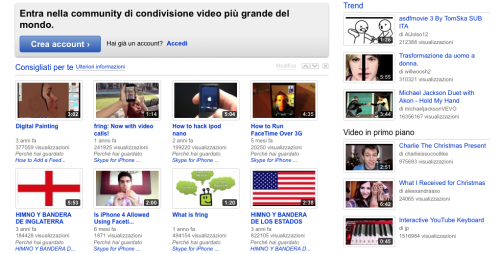Italy To Regulate YouTube & Other Video Sites Like TV Stations
YouTube, and parent Google, are now to be considered TV broadcasters in Italy according to new rules handed down by the Italian Communications Authority (AGCOM). The rules apply equally to other sites providing video content over the internet provided they’re also running advertising. According to a translated version of an article appearing in the Italian […]
YouTube, and parent Google, are now to be considered TV broadcasters in Italy according to new rules handed down by the Italian Communications Authority (AGCOM). The rules apply equally to other sites providing video content over the internet provided they’re also running advertising.
According to a translated version of an article appearing in the Italian newspaper La Repubblica, the rules impose the following burdens and obligations on YouTube and other online video providers:
- A €500 tax (under $700)
- A restriction content on inappropriate for children being shown during certain times of day
- A obligation to publish “corrections” to video content within 48 hours if requested by an alleged slander victim
- Potential liability for any and all content appearing on the site
 A year ago an Italian court found three Google executives liable for criminal privacy violations stemming from a video on YouTube in which several Italian teens were shown bullying and taunting a child with Down’s syndrome. One of the issues in the case was how long Google took to remove the video after being notified of its existence. Google appealed the convictions and the status of that appeal is unclear to us at the moment.
A year ago an Italian court found three Google executives liable for criminal privacy violations stemming from a video on YouTube in which several Italian teens were shown bullying and taunting a child with Down’s syndrome. One of the issues in the case was how long Google took to remove the video after being notified of its existence. Google appealed the convictions and the status of that appeal is unclear to us at the moment.
While there are some logistical challenges in dealing with the “scheduling” and “corrections” provisions of the new rules — how might a pure on-demand video site deal with conventional TV programming time slots? — the major issue, as others have pointed out, is the one of liability for the content appearing on YouTube. According to the rules, broadcasters that exercise editorial control over content, ipso facto, have liability for that content.
While it’s not entirely clear what “editorial control” means in this context the La Repubblica analysis argues unequivocally that YouTube would fall under the provision. That could mean a flood of litigation against YouTube as a practical matter.
Putting aside the anti-censorship arguments that one might make in defense of Google here, the idea of policing all this content represents a major headache practical challenge for Mountain View.
If the rules are interpreted and applied as suggested above it would be difficult-to-impossible for Google to enforce them. While traditional TV broadcasters deal with limited volumes of content and so can exercise greater editorial control, YouTube deals with video content at many orders of magnitude greater than conventional TV:
People are watching 2 billion videos a day on YouTube and uploading hundreds of thousands of videos daily. In fact, every minute, 24 hours of video is uploaded to YouTube.
The question is what does Google do if it can’t negotiate some concessions from regulators? Does it simply leave the country? And what might that mean? It would probably mean preventing any video uploads from an Italian computer. It might also mean blocking YouTube access in Italy altogether.
The stated idea behind the new rules is apparently to treat traditional and online video/TV in a more evenhanded way. It reflects the maturation of the internet in one way of looking at it. And while that’s conceptually fine, even correct perhaps, the problem is practical enforcement of the rules in a radically different online context.
Related posts:
Italian Court Finds Google Execs Guilty Of Violating Privacy Code
Contributing authors are invited to create content for Search Engine Land and are chosen for their expertise and contribution to the search community. Our contributors work under the oversight of the editorial staff and contributions are checked for quality and relevance to our readers. The opinions they express are their own.
Related stories